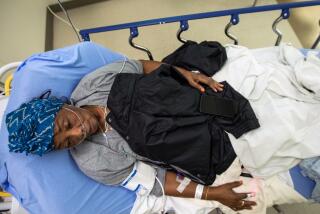As U.S. poverty rates climb, so may health woes for the poor
- Share via
Poverty levels are up in the U.S., the Census Bureau reports, with the percentage of Americans living in poverty at its highest point since 1993. That will likely translate into increasing health issues for those people, since being poor seems inexorably linked to poor health.
A number of studies have linked poverty to higher levels of cancer, cardiovascular disease, diabetes, and other diseases and conditions. While the association may seem obvious, the reasons can be complex: having little access to healthcare, less education about disease treatment and prevention, a scarce supply of healthful foods, fewer opportunities to exercise and embarrassment about one’s condition. Adults aren’t the only ones affected; some research focuses on children as well.
A study released this week in the Canadian Medical Assn. Journal found that those living in poorer neighborhoods may be at greater risk for having sudden cardiac arrest. Among 9,235 people living in seven cities in the U.S. and Canada who had cardiac arrest, the rate was much higher in the lowest socioeconomic neighborhoods compared with the highest.
Poverty may factor into survival rates for prostate cancer. A 2006 study in the journal Cancer found that poverty in the community, income levels and education were the most significant issues that factored into poor survival rates. Among the 61,228 study participants who had been diagnosed with prostate cancer, race played a minor role.
Being less fit was linked with lower socioeconomic levels in a 2006 study in the Journal of the American Medical Assn. Researchers looked at data on 30,043 people who underwent stress tests for coronary artery disease. After adjusting for factors such as smoking, insurance status and demographics, a strong link was seen between abnormal findings on the test and a lower socioeconomic standing.
If you’re poor, your chances of dying within five to 10 years after having heart surgery are greater, a 2010 study in the journal Circulation: Cardiovascular Quality and Outcomes found. In the study, 23,330 people who had heart bypass or valve surgery from 1995 to 2005 were tracked. For each decrease in socioeconomic position, there was a drop in long-term survival rates. Those in the lowest socioeconomic group had a 19% to 26% greater chance of dying within five years of having surgery compared with those in the highest group.
Children who are from poorer areas may have worse sleeping patterns compared with middle-class kids. A study presented at the 2007 meeting of the Associated Professional Sleep Societies surveyed the parents of 64 children about their kids’ sleep habits. Healthy children living at lower socioeconomic levels had more bedtime resistance, higher levels of sleep onset delay, sleep anxiety, daytime sleepiness and disordered breathing during sleep compared with middle-class children.






